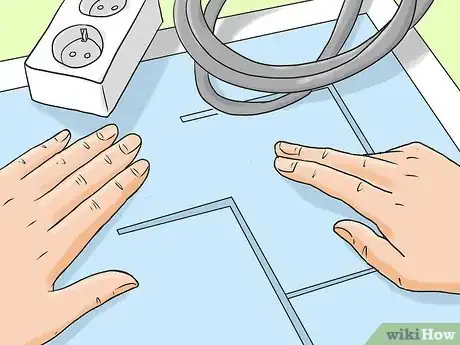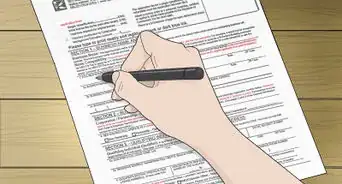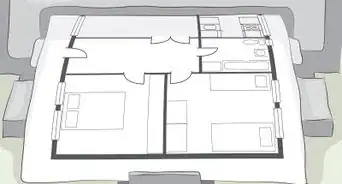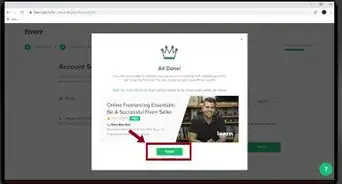This article was co-authored by GreatBuildz. GreatBuildz is a free service that matches homeowners with reliable, pre-screened general contractors. GreatBuildz was founded by a team of real estate and construction experts who believe everyone deserves to find a great contractor, have a stress-free renovation, and enjoy their beautiful new space. GreatBuildz connects homeowners with reputable contractors who passed their rigorous screening process and signed their code of conduct. GreatBuildz also individually selects contractors for the specific project and provides ongoing support to ensure everything goes smoothly.
There are 19 references cited in this article, which can be found at the bottom of the page.
This article has been viewed 47,744 times.
Hiring a contractor to work on your house can be stressful and expensive, but it doesn’t have to be. Take care to hire a contractor with excellent references and a good reputation, and be sure you have clear agreements and expectations before the contractors begin their work. It’s important to maintain good communication, while still allowing them to get on with the job you are paying them for. A little flexibility and understanding from all involved will help foster a good working relationship and a desirable outcome for everyone.[1]
Steps
Hiring Contractors
-
1Look for personal referrals. If you are looking to hire a contractor, all the online listings can be overwhelming and make it hard to judge to quality and record of a contractor. Begin your research by asking around trusted friends, families and neighbours. A personal recommendation from somebody you trust is perhaps the best review you can get.[2]
- Somebody who has first-hand experience of the contractor will be able to give you a clear account of their work and any problems that might have occurred.
- You may also consider asking local professionals in the industry, such as the manager of your local hardware store.[3]
-
2Know some questions to ask. If you are able to talk to people with experience of using particular contractors, it can be helpful to focus your questions to get the best picture of the contractor’s work. Ask if the contractor maintained open and clear communication throughout the project. Did they answer all questions satisfactorily? You want to make sure that you will be kept up to date with everything that is happening, and your contractors will listen to you.
- You should also ask about punctuality and reliability, as well as questioning whether the project was finished on time and on budget.
- Finally, ask if the person who hired the contractor was satisfied with the work done, and whether or not he would recommend the contractor to you.[4]
Advertisement -
3Create a shortlist. Even if you get a glowing review from a friend, you should always try to build up a shortlist of at least three different contractors who you can then approach and discuss the project with. You will be able to find plenty of local contractors through personal recommendations, online listings, and adverts.
-
4Check reviews and records. Before you contact any of the contractors on your list, take some time to look up online reviews. Anybody can leave a review online, and you should be aware that it may not give you the full story. Try to find more than one review to help you build up a more detailed picture of the contractor’s record.[5]
-
5Meet potential contractors in person.[8] Once you have a shortlist, be sure to make time to meet up with each contractor in person and talk through the job in detail. You shouldn’t be charged for this, and it gives you the opportunity to ask questions. If the contractor is reluctant to meet you, this could indicate that they are unreliable or untrustworthy.
- Ask for a detailed estimate about the cost and time-frame for the job, and get details of the business including the address.
- Ask for a fully itemised estimate for the work so you can better compare costs and prices across contractors.[9]
- Ensure that they are fully licensed and able to work in your state.
-
6Recognise some red flags. When you are in contact with the potential contractors, it’s a good idea to know some things to watch out for that can signal a dubious person or business. If the contractor pressures you to make a decision about whether or not you hire them quickly, you should be wary. The contractor should not request that you obtain any building permits yourself, and should not ask for a cash payment. Other red flags to watch out for include:
- If you are quoted a final price before the contractor has seen the full extent of the work.
- They only offer lifetime warranties which expire when their company ceases to exist.
- You are asked for a large down payment to purchase materials.
- You are offered a discount for an on-the-spot hiring decision.
- The contractors only provide a PO Box, rather than a full business address.
- You are requested to pay the complete amount upfront.[10]
Working with Contractors
-
1Make clear agreements. When you decide on who to hire, it’s crucial that the agreements you make are as clear and complete as possible. These are the documents that will shape how the work progresses. You will need to refer back to them from time-to-time, and especially if there are any problems.
- Try to avoid any allowances in the contracts where a particular fitting or cost is left undetermined because you haven’t gotten round to it yet.
- For example, if you getting a new bathroom but haven’t decided on the tiling, the allowance will be an estimate that could be well below the actual cost.[11]
- These uncertainties at the start can lead to disagreements and disputes later on in the project.
-
2Maintain good communications.[12] Having good communication between you and the contractor can help deal with any potential problems before they escalate.[13] Try to agree a schedule to meet or speak daily with the contractor so you are fully apprised of the situation. You could arrange to have a quick chat each morning when he arrives, or evening before he leaves. If you can’t get to the site, arrange for a daily phone call.[14]
- You should try and strike a balance whereby you are not permanently hovering around his shoulder, but you are updated daily.
- Showing that you are fully invested in the work and have a clear vision will help keep your contractor on his toes.
-
3Keep track of the work. While you may completely trust your contractor to do a great job, it’s advisable to take time to check the work yourself every day and record what you find. By doing this you are not just checking the quality of the work, but you will also be able to keep track of the overall progress and identify any issues before they escalate.
- You should check model numbers on appliances to ensure that they match up with those on the receipts.
- Check the position of windows and electrical fittings with the blueprints and plans.[15]
- Don’t be hesitant to point out a problem if you encounter one, mistakes can happen.
- Keeping a project journal is a good way to track the work and keep all your notes in one place.[16]
-
4Record any changes in writing. Once the project is in full-swing, it is always possible that something unforeseen can occur which causes the plans to change. It is important that you fully record and document any changes to your agreements and plans in writing, and keep this updated and signed by all parties throughout.[17]
- Verbal agreements are worthless if there is a dispute about the final bill.
- Written agreements protect both you and the contractor, so there should be no problem.[18]
Dealing with Disputes
-
1Set up a private meeting. If you have concerns about the work or conduct of your contractors, you should try to discuss it in private with the foreman or boss as soon as possible. Set up a private meeting, and don’t raise a problem loudly in front of a group of people. Be professional and create a situation where you can discuss the issue privately and calmly.
- Disagreements can arise, but remember that you hired the contractor to do a specific job.
- If all the building codes, safety and contract guidelines are being met, you have the final say.[19]
- You could say "I'm a bit concerned that some of the work doesn't reflect the original plans."
- You might say "Can you reassure me that the work will be completed by the time we originally agreed on?"
-
2Follow up with a letter. If the problem is not resolved in the meeting you should follow it up with a formal letter that is signed and dated. Clearly outline the problem and state how the contractor’s work is not in compliance with the original signed contract. Having a clear paper trail is useful if the issue is not resolved and you need to take it further.[20]
- Request a return receipt for the letter so you can prove that it was received by the contractor.[21]
- The letter could state that "you [the contractor] agreed to undertake work according to the contract, but as of yet have failed to do so."
- Try to be as specific as possible so there is no room for doubt.
-
3Consider legal advice. If the letter is not satisfactorily dealt with and the contractor seems unconcerned by the problem, you should consider seeking legal advice. You can have a free consultation with an attorney where you can explain the situation. You may then hire the attorney to write a letter to the contractor to advise them that they are in breach of contract.[22]
- If the foreman you have been working with is a member of staff at a larger company, it might be appropriate to address the letter to somebody more senior.
- If the contractor has taken money from you for supplies, the work has not been done, and the contractor does not respond to your attempts to contact him, call the police.[23]
- Be aware that if you pursue the case, the cost of hiring an attorney could be larger than the amount of money you recover.[24]
-
4Contact a consumer protection group. Another way to lodge a complaint against a contractor is by contacting an official consumer protection body.[25] Look for your local consumer protection services online, and check to see if your area has a Local Builders Association that may be able to help.[26] Other consumer protection groups to contact include:
Expert Q&A
Did you know you can get expert answers for this article?
Unlock expert answers by supporting wikiHow
-
QuestionWhy are general contractors so expensive?
 GreatBuildzGreatBuildz is a free service that matches homeowners with reliable, pre-screened general contractors. GreatBuildz was founded by a team of real estate and construction experts who believe everyone deserves to find a great contractor, have a stress-free renovation, and enjoy their beautiful new space. GreatBuildz connects homeowners with reputable contractors who passed their rigorous screening process and signed their code of conduct. GreatBuildz also individually selects contractors for the specific project and provides ongoing support to ensure everything goes smoothly.
GreatBuildzGreatBuildz is a free service that matches homeowners with reliable, pre-screened general contractors. GreatBuildz was founded by a team of real estate and construction experts who believe everyone deserves to find a great contractor, have a stress-free renovation, and enjoy their beautiful new space. GreatBuildz connects homeowners with reputable contractors who passed their rigorous screening process and signed their code of conduct. GreatBuildz also individually selects contractors for the specific project and provides ongoing support to ensure everything goes smoothly.
Contractor Matching Service
-
QuestionIs it necessary to have a younger person in the family present for, or have them as a cosigner on, a contract between a senior and a licensed contractor?
 Community AnswerIt's not necessary, but it would be a good idea. There are lots of people out there who would love the opportunity to scam an elderly person.
Community AnswerIt's not necessary, but it would be a good idea. There are lots of people out there who would love the opportunity to scam an elderly person. -
QuestionHow do I deal with contractors?
 Community AnswerFollow the advice here, be respectful and do your research.
Community AnswerFollow the advice here, be respectful and do your research.
References
- ↑ GreatBuildz. Contractor Matching Service. Expert Interview. 25 November 2020.
- ↑ GreatBuildz. Contractor Matching Service. Expert Interview. 25 November 2020.
- ↑ http://www.houselogic.com/home-advice/contracting/how-to-hire-a-contractor/
- ↑ https://trustedpros.com/hiring-guide#5
- ↑ http://www.houselogic.com/home-advice/contracting/how-to-hire-a-contractor/
- ↑ https://www.bbb.org/
- ↑ http://www.houselogic.com/home-advice/contracting/how-to-hire-a-contractor/
- ↑ GreatBuildz. Contractor Matching Service. Expert Interview. 25 November 2020.
- ↑ http://www.houselogic.com/home-advice/contracting/five-essential-questions-ask-before-hiring-contractor/
- ↑ https://trustedpros.com/hiring-guide#7
- ↑ http://www.houselogic.com/home-advice/contracting/getting-best-work-contractor/2/
- ↑ GreatBuildz. Contractor Matching Service. Expert Interview. 25 November 2020.
- ↑ https://trustedpros.com/hiring-guide#13
- ↑ http://www.houselogic.com/home-advice/contracting/getting-best-work-contractor/3/
- ↑ http://www.houselogic.com/home-advice/contracting/getting-best-work-contractor/6/
- ↑ http://www.houselogic.com/home-advice/contracting/getting-best-work-contractor/4/
- ↑ http://www.houselogic.com/home-advice/contracting/getting-best-work-contractor/5/
- ↑ https://trustedpros.com/hiring-guide#12
- ↑ https://trustedpros.com/hiring-guide#13
- ↑ https://trustedpros.com/hiring-guide#13
- ↑ http://money.usnews.com/money/personal-finance/articles/2014/09/09/how-to-deal-with-a-bad-contractor
- ↑ https://trustedpros.com/hiring-guide#15
- ↑ http://money.usnews.com/money/personal-finance/articles/2014/09/09/how-to-deal-with-a-bad-contractor
- ↑ http://www.houselogic.com/home-advice/contracting/how-fight-back-against-bad-contractor/4/
- ↑ https://trustedpros.com/hiring-guide#15
- ↑ http://www.nahb.org
- ↑ http://www.ftc.gov/bcp/consumer.shtm
- ↑ http://www.consumeraction.gov/state.shtml









































































